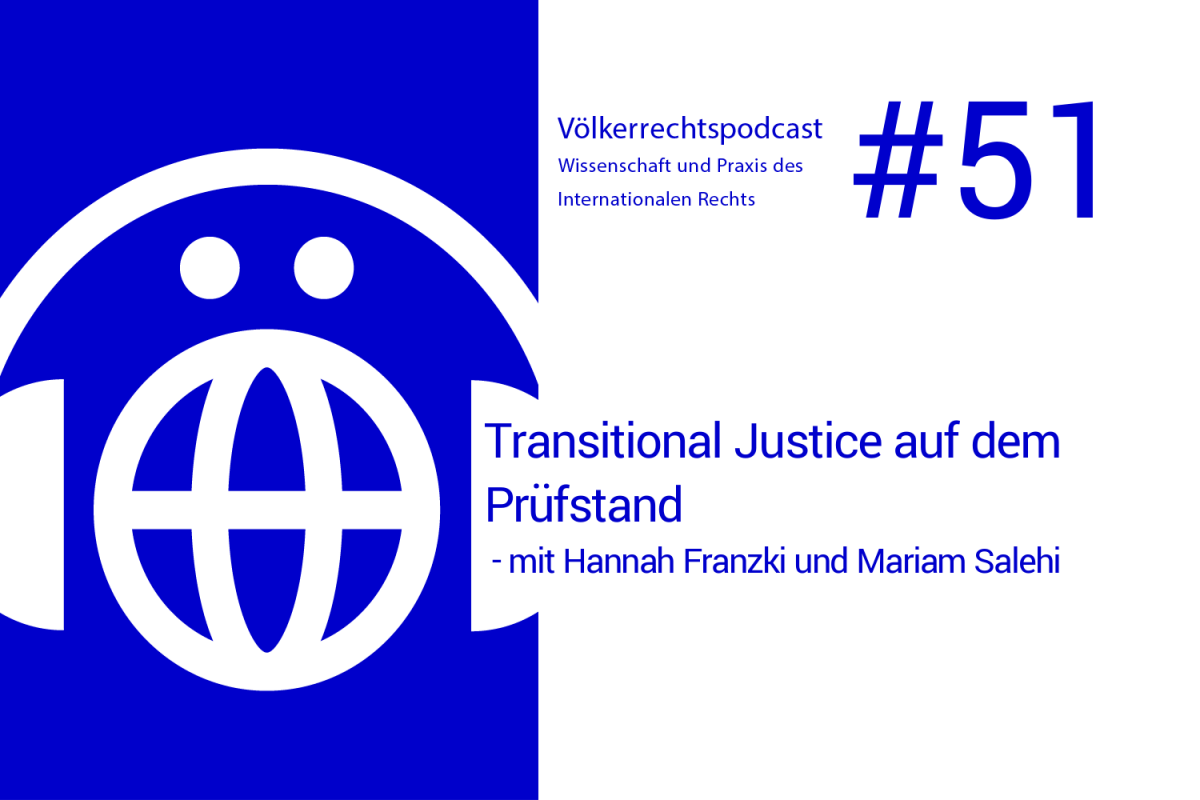Diese Folge nimmt Transitional Justice (TJ) genauer unter die Lupe. Unter TJ versteht man rechtliche und politische Maßnahmen, die darauf abzielen, eine gewaltvolle Vergangenheit aufzuarbeiten und zu einer neuen, gerechteren Ordnung beizutragen. Zu den zentralen Instrumenten zählen die strafrechtliche Verfolgung schwerer Menschenrechtsverletzungen, Wahrheits- und Versöhnungskommissionen, Reparationen, politische Reformen sowie Gedenkinitiativen. Im Grundlagenteil beleuchtet Isabel Lischewski die Arbeit von Wahrheits- und Versöhnungskommissionen im Detail.
An TJ-Prozessen sind zahlreiche gesellschaftliche Akteure mit unterschiedlichen Interessen beteiligt, was häufig zu Spannungen führt. Angesichts aktueller Konflikte stellt sich zudem die Frage, welche Erfolge und Grenzen frühere TJ-Prozesse aufweisen und welche Lehren daraus gezogen werden können. Vor diesem Hintergrund stellt Jasmin Wachau gemeinsam mit ihren Interviewpartnerinnen Hannah Franzki und Mariam Salehi Transitional Justice auf den Prüfstand. Dabei bleibt es nicht bei der Theorie: Durch konkrete Praxisbeispiele wird das Thema anschaulich und greifbar gemacht.
Wir sind gespannt auf eure Rückmeldungen! Lob, Anmerkungen und Kritik sind herzlich willkommen an podcast@voelkerrechtsblog.org. Abonniert unseren Podcast via RSS, über Spotify oder überall dort, wo es Podcasts gibt. Es gibt die Möglichkeit, auf diesen Plattformen den Völkerrechtspodcast zu bewerten, wir freuen uns über 5 Sterne!
Hintergrundinformationen
- Selbi Durdiyeva, Towards Decolonial Agenda for Transitional Justice: “The Old is Dying and the New Cannot Be Born”, in: Thamil Venthan Ananthavinayagan & Amritha Viswanath Shenoy (Hrsg.), The Wretched of the Global South: Critical Approaches to International Human Rights Law (2024).
- Hannah Franzki, Criminal Trials, Economic Dimensions of State Crime, and the Politics of Time in International Criminal Law: A German-Argentine constellation (2018).
- Hannah Franzki, Totalitärer Staat und freie Wirtschaft. Zu den Bedingungen von Freiheit in den Nürnberger Industriellenprozessen, Zeitschrift für Friedens- und Konfliktforschung 13 (2024).
- Hannah Franzki & Maria Carolina Olarte, Understanding the political economy of transitional justice: A critical theory perspective, in: Susanne Buckley-Zistel, Theresa Koloma Beck, Christian Braun & Friederike Mieth (Hrsg.), Transitional Justice Theories (2013).
- Hannah Franzki, Von Staatsstreich und Teufelspakt: Zustände der Ausnahme, in: Andreas Fischer-Lescano, Hannah Franzki & Johan Horst (Hrsg.), Gegenrechte: Recht jenseits des Subjekts (2018).
- Leena Grover, Transitional Justice, International Law and the United Nations, Nordic Journal of International Law Issue 88 (2019).
- Anne Menzel, Mariam Salehi, Global Hierarchies and Unequal Pressures in the Report-Making of Truth Commissions, International Studies Review 26 (2024).
- Rosemary Nagy, Transitional Justice as Global Project: Critical Reflections, Third World Quarterly 29 (2008).
- Mariam Salehi, Reparationen für eine gerechte Weltwirtschaftsordnung, in: Alex Veit & Daniel Fuchs (Hrsg.), Eine gerechte Weltwirtschaftsordnung? Die »New International Economic Order« und die Zukunft der Süd-Nord-Beziehungen (2023).
- Mariam Salehi, Transitional Justice in Process. Plans and Politics in Tunisia (2022).
- Ruti G. Teitel, Transitional Justice Genealogy, Harvard Human Rights Journal 16 (2003).
Moderation: Jasmin Wachau & Rouven Diekjobst
Grundlagen: Dr. Isabel Lischewski
Interview: Dr. Hannah Franzki, Dr. Mariam Salehi & Jasmin Wachau
Schnitt: Daniela Rau
Credits: UN Human Rights, Tunisia launches Truth and Dignity Commission, 10 Juni 2014, https://www.youtube.com/watch?v=S1QJz1Pko-o

Jasmin Wachau is a doctoral researcher and research fellow at the Assistant Professorship of Public International Law and International Administrative Law at the University of Erfurt. She is an Editor of Völkerrechtsblog.

Rouven Diekjobst, MJur (Oxon.) is a PhD student and Research Associate at Ruhr-University Bochum’s Institute for International Law of Peace and Armed Conflict. He is a managing editor and podcast co-host at Völkerrechtsblog.


Dr. Isabel Lischewski is an Editor and Podcast Co-Host at Völkerrechtsblog as well as a post-doctoral researcher focusing inter alia on gender, governance, and education in international and German public law at University of Münster.